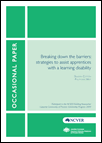Description
Apprentices with a learning disability can face significant barriers to completing their training. This paper explores what these apprentices, their lecturers and disability support staff see as the most effective strategies for helping them to overcome these difficulties. Instructional approaches which accommodate students' learning styles, individual tutoring and supportive relationships were endorsed by all groups as effective. This research was undertaken by a novice researcher in the Community of Practice scholarship program, which is funded through NCVER's Building Researcher Capacity initiative.
Summary
About the research
Building the research capacity of the vocational education and training (VET) sector is a key concern for the National Centre for Vocational Education Research (NCVER). To assist with this objective, NCVER supports a community of practice scholarship program, whereby VET practitioners without research experience are given the opportunity to undertake their own research to address a workplace problem. Scholarship recipients are supported by a mentor, and NCVER publishes their research results.
Sandra Cotton participated in the 2009 community of practice program. Sandra is the disability services manager at Polytechnic West in Western Australia. Her research explores the difficulties confronting apprentices with a learning disability and strategies that assist them to overcome these difficulties and to achieve unit of competency completion.
The study comprised a survey of apprentices with a learning disability, a focus group made up of lecturers and disability services staff, and interviews with family members to identify the successful strategies used by apprentices, lecturers and support staff.
Key messages
- The apprentices surveyed reported having the most difficulties with reading and understanding texts. Focus group participants pointed out that the frustration this causes students can lead to other problems such as withdrawal from participation in class and denial of the problem. Non-disclosure was seen as a big concern as it limited the amount of support students could be given.
- Instructional approaches that accommodate students' learning styles, individual mentoring or tutoring to help clarify concepts, and supportive relationships were strategies endorsed by both the apprentices and the staff as effective in helping the students to complete units of competency.
Tom Karmel
Managing Director, NCVER
